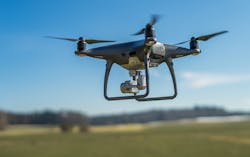DOT punts on UAS remote ID rule until December; industry players express frustration
WASHINGTON – The U.S. Department of Transportation released its update on significant rulemakings report last week and the unmanned aircraft system (UAS) industry expressed frustration when the DOT and Federal Aviation Administration (FAA) again "kicked the can" on implementing remote identification for UAS. The government did not specify why the implementation was again delayed.
"Publication of FAA proposed Remote ID rule is delayed again," tweeted DJI vice president of policy and legal affairs Brendan Schulman on Sept. 6. "Now scheduled for December 20. These delays are impeding important solutions to security and accountability challenges."
Schulman continued, tweeting, "Meanwhile, 'unofficial' Remote ID solutions that already exist are making a difference and facilitating the development of security response plans."
The DJI executive cited a program in the United Kingdom regarding "unofficial" programs.
The Association for Unmanned Vehicle Systems International, an organization focused on unmanned systems and robotics, which represents companies and professionals from 60 countries, also expressed its displeasure with the delay on remote ID, with Brian Wynne, president and CEO of AUVSI, issuing a statement on Friday, Sept. 6.
“It’s disappointing the rulemaking for remote identification has been delayed again. The need for remote identification cannot be overstated, as the advancement of the UAS industry depends on identifying and tracking UAS flying in the airspace," commented Wynne. "Remote ID is necessary for enabling advanced and expanded operations such as flights over people and beyond line of sight, which will provide significant benefits throughout our economy and society. Most importantly, remote ID is critical for ensuring airspace safety by helping law enforcement identify and distinguish authorized UAS from those that may pose a security threat. We urge the FAA to move as quickly as possible with rulemaking for remote identification to keep the skies safe for all aircraft – both manned and unmanned.”
The DOT said in its report that it expects the new rules to be implemented on December 20, with the comment period ending February 1, 2020.
The DOT significant rulemaking report also touched on drone flights around critical infrastructure and rest requirements for flight attendants.
About the Author
Jamie Whitney
Senior Editor
Jamie Whitney joined the staff of Military & Aerospace Electronics in 2018 and oversees editorial content and produces news and features for Military & Aerospace Electronics, attends industry events, produces Webcasts, and oversees print production of Military & Aerospace Electronics.
